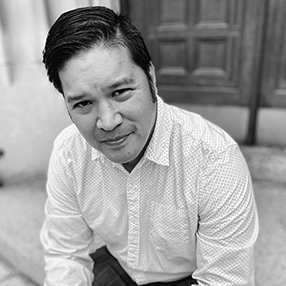Advice for Using Blood in a Poem
If someone suggests you use words besides
blood in your poems, make it part of a recipe
Try dinuguan, for example
Make your blood impossible to avoid
Another name for this dish is chocolate
meat, the name your aunts used to hide
from you the fact you were eating
pork blood with your rice
Other ingredients may include garlic, onions,
liver, pork belly, dried bay leaf,
vinegar, chicken stock, etc.
Say you know the difference between blood and sweetness
Say you hate the taste of liver
Think of the blood in your poem as a lie
Say this is also your blood: the Spanish
explorer Miguel Lopez de Legazpi and the Datu
Sikatuna, who poured blood from their left
arms into the same cup, mixed it
with wine before drinking
Make a sculpture for the promises you have made
with blood that belonged to someone else
Put it on an island you have never visited
and encourage others to see it
Dream about a volcano and an earthquake,
about the gunfire the day they carried
your grandfather to the cemetery after
he cracked his skull on the bathroom floor,
about the hair of your parents sticky
with blood, the glass beneath their skin,
the scabs on their lips
When you came to retrieve
their luggage, their sandy fishing gear
from the wreckage of their car, you found
the bloodstains on the exposed air bags,
the dashboard, the jacket wet
with rainwater wedged between the seats
Consider the insects that gathered around
all the blood you would not touch
Count the number of times
this blood appears
When you close your eyes, what is
the color of your blood?
No cheating
Copyright © 2021 by Albert Abonado. Originally published in Poem-a-Day on March 10, 2021, by the Academy of American Poets.
“In workshops, we are often taught that the history of language can make the use of certain words more complicated, the word ‘blood’ being one such example. We shouldn’t use blood because blood has been used so often. What does that say about the tangled legacies of colonialism, language, and violence? If we avoid blood, what does that suggest about our relationship with the body?”
—Albert Abonado

